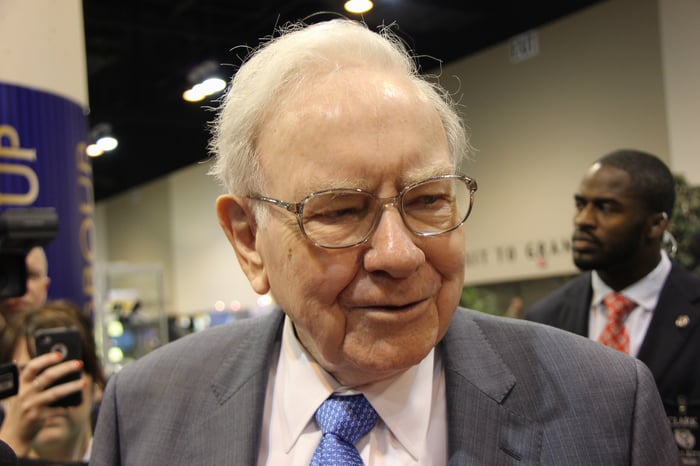For nearly six decades, Berkshire Hathaway (BRK.A 0.64%) (BRK.B 0.54%) CEO Warren Buffett has been a money machine for his shareholders. Since taking the helm as CEO in 1965, he's created more than $595 billion in value for shareholders (himself included), and overseen a hearty 20.1% annualized return on his company's Class A shares (BRK.A). That's almost double the 10.5% average annual total return, including dividends, of the S&P 500 over the same stretch.
Buffett's success is due to a laundry list of factors, such as his penchant for buying dividend stocks, and loading Berkshire Hathaway's investment portfolio with cyclical businesses. But the Oracle of Omaha's true secret sauce might just be his willingness to hang on to high-quality businesses over long periods.

Berkshire Hathaway CEO Warren Buffett. Image source: The Motley Fool.
Buffett has repeatedly demonstrated that doing nothing can be extremely powerful when investing. The following four Warren Buffett stocks have all been continuous holdings in Berkshire Hathaway's portfolio for at least the past 21 years.
Coca-Cola: Continuous holding for 34 years
The longest-tenured holding in Berkshire's portfolio is beverage stock Coca-Cola (KO 0.68%). Coke has been a core holding for Buffett's company since 1988.
One of the best things about Coca-Cola is the company's geographic diversity. With the exception of North Korea, Cuba, and Russia (the latter because of its invasion of Ukraine), Coke has operations in every other country around the world. This means it can take advantage of highly predictable operating cash flow in developed markets, while generating higher organic growth from emerging markets.
To build on this point, Coca-Cola ranked as the strongest brand in the U.S. last year, according to Brand Finance. The formula used to calculate brand value include factors like customer familiarity with a brand, marketing investments, and corporate reputation. Having an easily identifiable brand, along with selling non-discretionary beverages, helps Coca-Cola navigate economic downturns better than most companies.
Coca-Cola's marketing is also a marvel. It's one of a small handful of companies that has little trouble transcending generational gaps and engaging with people of all ages. The company's holiday tie-ins, point-of-sale marketing, and social media campaigns offer multiple channels for it to engage current and future customers.
American Express: 29 years
The second longest-held Warren Buffett stock is credit-services provider American Express (AXP -0.08%). AmEx has been a fixture in Berkshire Hathaway's portfolio since 1993.
As noted, the Oracle of Omaha loves to pack his company's portfolio with cyclical businesses. Even though recessions are an inevitable part of the economic cycle, periods of expansion last substantially longer than contractions. That's particularly good news for American Express, which is able to double-dip during periods of expansion.
First off, AmEx collects fees from merchants when processing transactions. As the U.S. and global economy expand over time, processing fees should grow as well. But AmEx also generates fees and net-interest income from being a lender and offering credit accounts to people and businesses. While this does expose the company to loan delinquencies and possible charge-offs during contractions, it enjoys those aforementioned long periods of economic expansion.
American Express has a knack for attracting affluent clientele as well. Cardholders with higher incomes are less likely to alter their spending habits during minor economic contractions.

Image source: Getty Images.
Moody's: 22 years
A third stock Buffett has held for an exceptionally long time is credit-rating agency Moody's (MCO -0.22%). Berkshire Hathaway has been a shareholder since 2000, which is when Moody's was spun-off from Dun & Bradstreet.
Moody's has two core operating segments, and they've each played an important role in its success. The more familiar of the two is its credit-rating operations. Following a decade of historically low lending rates, Moody's was kept busy evaluating the quality of corporate debt issuances.
However, the next decade is likely to be all about the company's analytics division. This is the segment that helps businesses assess credit risks, as well as aids with regulatory compliance. With the world still navigating a pandemic and dealing with historically high inflation in a number of developed markets, Moody's Analytics has the potential to sustain low double-digit annual sales growth for the foreseeable future.
This is also a good time to mention that holding dividend-paying stocks for long periods can dramatically increase the yield you'll receive, relative to your cost basis. In Berkshire Hathaway's case, its yield to cost on Coca-Cola, American Express, and Moody's is a jaw-dropping 54%, 24%, and 28%, respectively. With annual yields of this magnitude, there's no reason for Buffett and his team to ever sell these stocks.
Globe Life: 21 years
Next to bank stocks, insurance companies are one of Buffett's favorite places to put his company's money to work. Insurance company Globe Life (GL 2.80%), which was known as Torchmark until August 2019, has been a continuous holding for Berkshire Hathaway since 2001.
Although selling life and health insurance is a boring operating model, it's a highly profitable one for Globe Life. Because catastrophes (and the higher payouts that accompany them) are an inevitability in the insurance landscape, companies that underwrite insurance policies rarely, if ever, have trouble increasing premiums. This premium pricing power is what makes insurers like Globe Life such steady performers.
Something else that should have Globe Life shareholders excited is rapidly rising bond yields and a hawkish Federal Reserve. Globe Life's fixed maturity portfolio, which primarily consists of investment grade corporate bonds, municipal bonds, and to a lesser extend government debt, should benefit over time from higher yields.
To add, it's common for insurance companies to invest their float (i.e., the unused portion of collected insurance premium) in relatively safe interest-earning assets. A rising-rate environment should be music to Buffett's ears.





